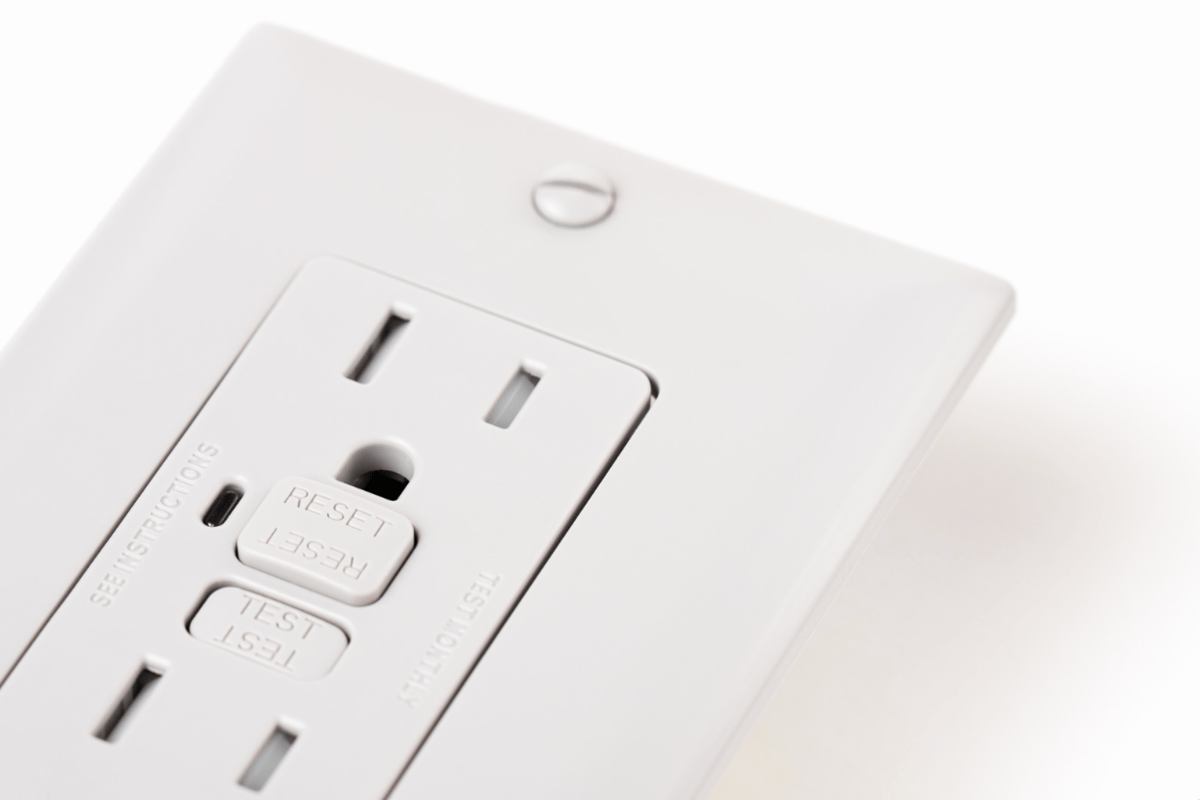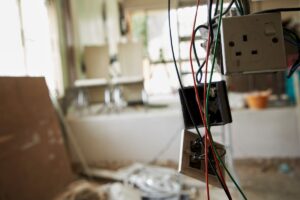Key Takeaways:
- GFCI outlets protect against electrical shock and are required in areas exposed to moisture or outdoor conditions.
- The National Electrical Code mandates GFCI outlets in bathrooms, kitchens, garages, outdoor areas, laundry rooms, basements, and crawl spaces.
- GFCI outlets must be tested monthly using the test/reset buttons to ensure proper function.
- These outlets can wear out over time, and regular inspections help detect issues before they become safety hazards.
- The cost of installing GFCI outlets varies depending on location, wiring complexity, and panel condition, but professional service ensures safety and compliance.
- W3 Electric offers expert service with local knowledge and transparent pricing for safe, code-compliant installation in Rockwall.
When it comes to safety in areas like your kitchen, bathroom, or backyard, GFCI outlets quietly do a lot of the heavy lifting. These smart devices shut off power the moment they detect something unsafe, like moisture where it shouldn’t be or a faulty appliance that could cause a shock.
If you live in Rockwall, staying up to code means knowing where GFCIs are required and making sure they’re working as they should. Whether upgrading old outlets, remodeling your home, or being proactive, here’s what you need to know about GFCIs and how W3 Electric can help you get it done safely and correctly.
What a GFCI Outlet Is and Why It Matters
Ground Fault Circuit Interrupter (GFCI) outlets are designed to detect electrical current imbalances, which are typically caused when electricity strays outside the intended path, such as through water or the human body. If a ground fault is detected, the outlet shuts off power in milliseconds to prevent electrocution.
Unlike standard outlets, GFCIs reduce the risk of shock in high-moisture environments like kitchens, bathrooms, and outdoor areas. Their quick-response mechanism is foundational to modern electrical safety, particularly in homes with children, elderly residents, or outdoor electrical access.
GFCIs (Ground Fault Circuit Interrupters) and AFCIs (Arc Fault Circuit Interrupters) are critical safety devices that protect your home differently. GFCIs are designed to prevent electric shocks by cutting off power when they detect even a slight imbalance in the flow of electricity, often caused by water coming into contact with electrical devices.
AFCIs, on the other hand, help prevent electrical fires caused by damaged or aging wiring behind walls. They detect dangerous arcing, when electricity jumps across gaps in a wire or connection, and shut off power before heat can build up and ignite surrounding materials. While GFCIs focus on shock prevention, AFCIs are all about fire prevention. Both should be installed by a licensed electrician and tested regularly to ensure they’re working properly. Together, they offer a powerful layer of protection for modern homes.
Where does the Code require GFCI Outlets?
According to the National Electrical Code (NEC), GFCI outlets must be installed in areas with a higher risk of shock. Here’s a breakdown of where GFCI outlet installations are required, and why hiring a licensed professional ensures your home stays compliant and safe.
- Bathrooms: GFCI outlets are required for all outlets within 6 feet of a sink or water source.
- Kitchens: Any outlet servicing countertop surfaces must be GFCI-protected.
- Garages: All outlets, including those used for freezers or tools, must be GFCI-protected.
- Outdoor Areas: All exterior outlets, including those on porches, patios, and exterior walls, must be GFCI.
- Laundry Rooms: Outlets within 6 feet of a sink or washing machine must be GFCI.
- Basements and Crawl Spaces: Unfinished areas are especially vulnerable to moisture, making GFCI a must.
A professional electrician ensures proper installation and compliance with Rockwall’s local codes, which may include additional guidelines beyond national standards.
How to Test GFCI Outlets
Like smoke detectors, GFCI outlets require regular testing to ensure they work correctly.
Here’s a quick guide on how to do it:
- Locate the test and reset buttons on your GFCI outlet. These are usually in the center of the outlet face.
- Press the “Test” button. This should immediately cut power to anything plugged into the outlet.
- Press the “Reset” button to restore power.
If the outlet doesn’t trip when tested or doesn’t restore power when reset, it’s time to call a professional. The National Fire Protection Association (NFPA) recommends testing GFCI outlets once a month. This simple step can prevent shock, appliance damage, or fire risk.
Do GFCI Outlets Go Bad Over Time?
Yes, GFCI outlets can and do fail. Like any electrical component, they degrade with age or heavy use. Most outlets last 10–25 years, but signs of failure can appear sooner, especially in high-use or outdoor locations.
Warning signs include:
- Outlet no longer trips when tested
- Frequent, unexplained tripping
- The reset button doesn’t restore the power
- Buzzing or discolored faceplate
Regular inspection by a licensed electrician ensures every outlet functions as intended, especially in older Rockwall homes or properties with previous DIY electrical work.
Understanding GFCI Outlet Installation Cost
GFCI outlet installation cost depends on several factors:
- Location of the outlet (interior, exterior, hard-to-access areas)
- Wiring accessibility
- Electrical panel capacity (especially if upgrades are needed)
- Labor and permitting costs in Rockwall
On average, professional installation, including materials, ranges from $150 to $300 per outlet. While cheaper DIY options exist, incorrect installation can result in unsafe conditions or failed inspections. With something as critical as electrical safety, professional service pays off in peace of mind and long-term reliability.
Why Choose W3 Electric for GFCI Outlet Installation in Rockwall
When protecting your home and meeting local electrical codes, you need a company that understands both the technical side and the community it serves.
W3 Electric offers:
- Licensed, certified electricians trained in NEC and local Rockwall code
- Years of trusted experience in residential electrical systems
- High-quality parts and industry-approved installation methods
- Prompt, friendly service with transparent pricing and no upselling
From historic homes near downtown Rockwall to newer developments on the outskirts, we tailor every GFCI installation to the specific needs of your home.
Conclusion: Trust the Pros with Your GFCI Installation
GFCI outlets aren’t just a box to check on an inspection report; they’re a crucial line of defense against electrical shock, especially in wet or high-use areas of your home. Understanding where they’re required and how to maintain them helps you protect your family and stay compliant with the Code.
Ready to upgrade your outlets for better safety and code compliance? W3 Electric offers fast, professional GFCI installation in Rockwall, with transparent pricing and local expertise you can trust. Book your service today and protect your home the right way.
FAQ: GFCI Outlet Installation in Rockwall
1. What does a GFCI outlet do?
A GFCI (Ground Fault Circuit Interrupter) detects electrical current imbalances and quickly shuts off power to prevent electric shock, especially in wet or damp environments.
2. Where are GFCI outlets legally required?
According to the National Electrical Code, GFCI outlets must be installed in bathrooms, kitchens, garages, outdoor areas, laundry rooms, unfinished basements, and crawl spaces.
3. How do I test my GFCI outlets?
Press the “test” button on the outlet. If it shuts off power, it’s working—press “reset” to restore power. Test your GFCIs at least monthly to ensure they function correctly.
4. Can GFCI outlets fail over time?
Yes. Like all electrical components, GFCIs wear out, especially in high-use or harsh environments. Signs of failure include frequent tripping, failure to reset, or no response when tested.
5. How much does GFCI outlet installation cost?
The average cost ranges from $150 to $300 per outlet, depending on location, accessibility, wiring conditions, and the capacity of your electrical panel.
6. Can I install a GFCI outlet myself?
While DIY installation is possible, it’s not recommended. Incorrect installation can create safety hazards or result in failed inspections. Licensed electricians ensure proper grounding and code compliance.








